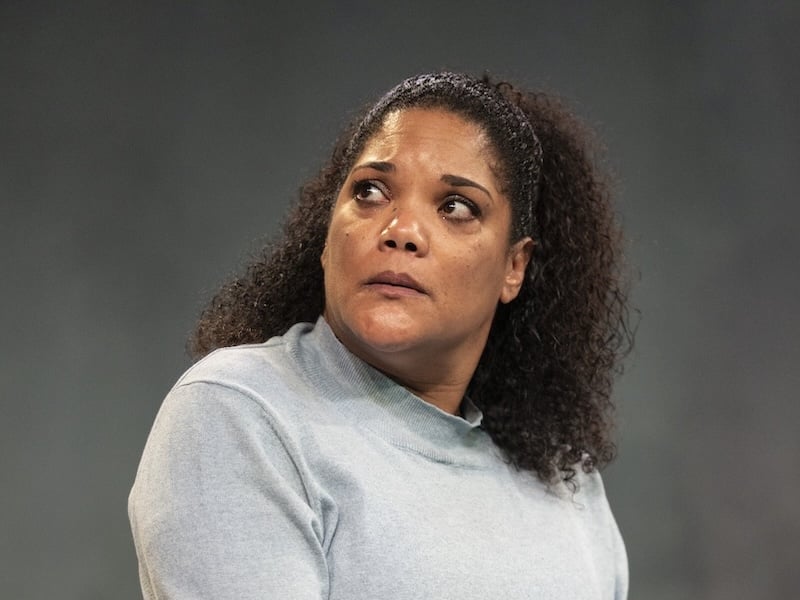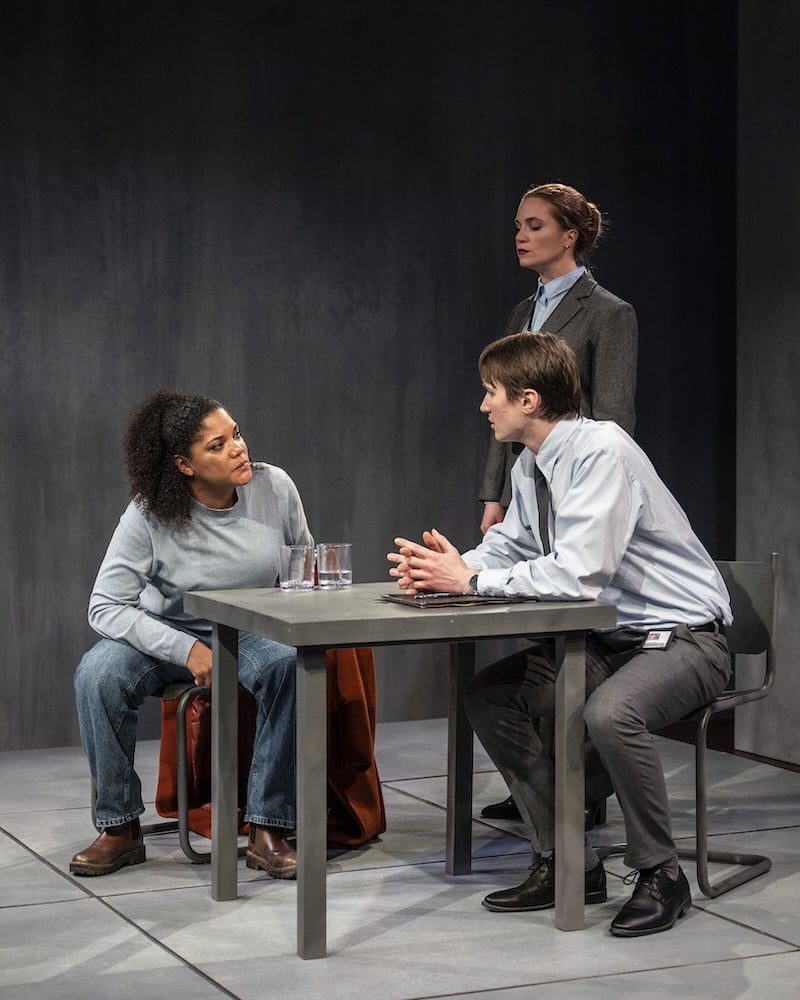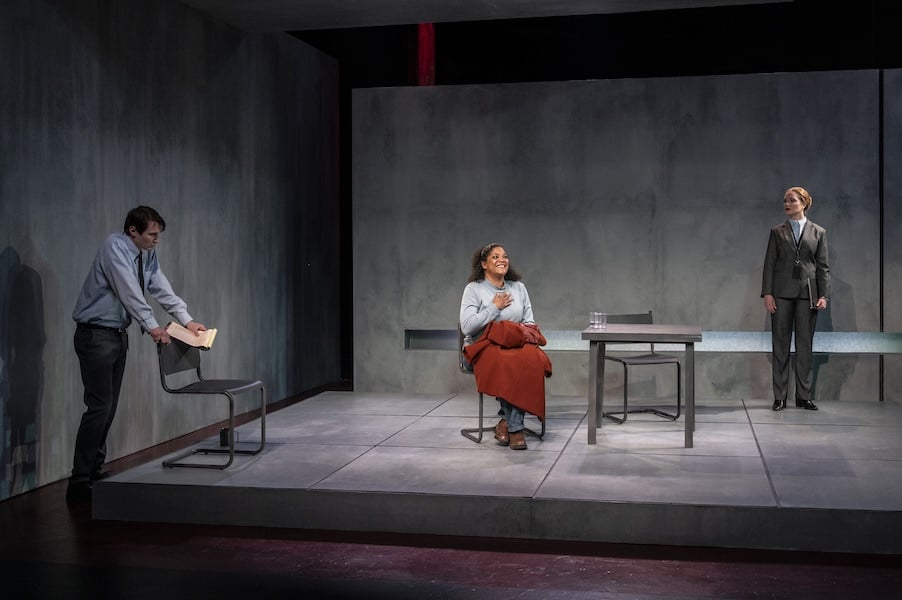Here is what we know. Three years after what appears to have been an unspeakable crime, a survivor arrives at an office and faces off against two others who are ostensibly instruments of the judiciary. They question her about her family, her choice to come alone, and ultimately about a decision. We learn that their job is to witness, record, and potentially influence the survivor’s consequential decision — its full portent unrevealed until late in the play. The bureaucrats are focused on procedure. But the survivor still clearly suffers the aftermath of the crime she endured, as does her family.
One of the marvels of the play is that the world outside is of the play but not in the play, the world we must create in our imaginations about the particulars that we are not shown. Here is what we don’t know. What happened three years ago is a mystery. The names, identities, and formal roles of the bureaucrats, as well as the survivor’s name, are unknown. Furthermore, we don’t know the nature of the decision she must make.

Situated in Britain, hang by debbie tucker green, directed by Deidra LaWan Starnes, traps us within an imagined legal system (in an indeterminate time) that grants crime victims outsize power to render a decision about a perpetrator’s fate. hang premiered at London’s Royal Court Theatre in 2015, in a production directed by the author.
Playing at 1st Stage, this drama is for theatergoers who relish mystery and don’t want to be spoon-fed a story. Moreover, it’s for patrons willing to wrestle with wrenching questions about what a system of justice owes to victims, those unafraid of an unflinching glimpse of what reclaiming power might look like, as well as what surviving really means.
As the action progresses (or devolves), tempers flare. Demands intensify. The bureaucrats bicker and misstep, and the survivor gives as good as she gets as she battles them in a duel for power and control. It’s riveting to behold the bureaucrats neglecting the emotional and human dimensions of the survivor’s trauma in favor of procedure, inanities, and just plain clumsiness. Of course, nothing like this occurs in real life, where functionaries overlook the deeper emotional weight of a situation, prioritizing process over the personal anguish involved. Nope, no resonance to today!
But playwright debbie tucker green isn’t having it. Her script is constructed with vivid direct imagery, resisting abstractions. She zeroes in on the trauma. For example, the survivor explains that her child has attended three schools and has been in six classes with four teaching assistants — not that he is having a problem in school. She is blunt about intimacy with her husband, rejecting euphemism. She conjures sight and smell when she talks of piss-stained sheets rather than soiled bed linens. Indeed, her script is a tour-de-force combination of specificity, brutal honesty, and raw power. It locks you into her survivor’s journey.

Equally brilliant is the subtext created by the words unsaid, the sentences unfinished, and the unfilled conversational gaps as acted by Patrick Joy and Ellis Green, who are outstanding as the bureaucrats. Listening to them trip up and speak over one another, either trying to say something or trying not to say something, draws in the audience. We wonder: What were they going to say? Why didn’t they finish saying what they were about to say? Why did one prevent the other one from speaking? The conversational calisthenics also added much-needed humor and the chance to laugh during a devastatingly serious drama.
Helen Hayes–nominated Patrick Joy was subtle and touching. He was notable as the arguably less senior of the officials by eliciting sympathy in a role that could have been caricatured in less able hands. His missteps communicated an ingratiating, people-pleasing personality, without asking the audience to like him. Well-known DC-based actor Ellis Greer’s characterization — erect posture, never unbuttoned jacket, flashing eyes, and curt delivery — conveyed a compelling depiction of low empathy, think the anti–Olivia Benson (Law & Order: Special Victims Unit). This isn’t to say the functionaries don’t take her seriously. They do, yet are nonetheless inept. In her corner or just in the room? You decide.

Lolita Marie, a three-time Helen Hayes Award recipient and 2025 Supporting Actor nominee, furthers her reputation in the leading role of the survivor. Marie is spellbinding, severe and challenging, soundless and withdrawn, always intense, and mostly vulnerable. Her portrayal of one indefatigable woman standing in her power lifts her survivor’s story from bleakness to bravery. You can’t look away from her pride and seething pain as she parries with Joy and Greer as the bureaucrats. The tension that she creates plays out with every movement, every utterance, and her every breath. In the final scene (no spoilers), Marie holds us breathless in the palm of her hand and does not let go.
Director Deidra LaWan Starnes’ production is a triumph. Under her direction hang is thrilling and taut with tension from beginning to end. You will feel it long afterward.
The production design adds to the power of the acting and script. The set is an austere room mounted on a platform containing folding chairs and a table, all angles. It’s cold and gray and lifeless, except that it is bordered on the floor with a blood-red paint strip, the color matching a single red column towering in a corner. It resembles the standard interrogation room we’ve seen on TV network crime procedurals or a prison waiting room, devoid of humanity except for the water dispenser perched on a chair next to a long counter. Early in the performance, the survivor asks if she is being recorded or watched. The room certainly appears to be one where the audience is placed on the viewing side of a one-way mirror.
Additionally, the music and lighting reinforce the mood of the production. From the sounds of breathing, high-pitched tones, and what seemed to be a background hum as if the room was alive — or maybe dying — to lights that blinked and dimmed at unexpected moments, the show achieved a coherent intensity that is hard to overstate.
Is the ending bleak, brave, or both? You decide.
hang at 1st Stage is a wholly original show. It’s gripping, illuminating, moving, and superbly acted. This is a must-see production that demands to be experienced.
Don’t miss it. Five out of five stars.
Running Time: 90 minutes with no intermission.
hang plays through March 30, 2025 (Thursdays/Fridays/Saturdays at 7:30 pm and Saturdays/Sundays at 2 pm), at 1st Stage, 1524 Spring Hill Road, Tysons, VA. Purchase tickets ($55 for general admission, with limited tickets for $25 and $40 at each performance) by calling the box office at 703-854-1856, going online, or in person before each performance. Select performances are open-captioned and/or audio-described. Open seating.
The digital playbill is downloadable here.
COVID Safety: 1st Stage is now a mask-optional space with select mask-required performances offered for each show. See 1st Stage’s complete COVID Safety Information here.
hang
By debbie tucker green
Directed by Deidra LaWan Starnes
Produced by Patricia Tetro and Jack Wilbern
CAST
Lolita Marie (Three)
Patrick Joy (Two)
Ellis Greer (One)
PRODUCTION AND DESIGN TEAM
Set Design: Giorgos Tsappas
Lighting Design: Venus Gulbranson
Sound Design: Justin Schmitz
Costume Design: Cidney Forkpah
Props: Pauline Lamb
Intimacy Coordinator: Lorraine Ressegger-Slone
Stage Manager: Sarah Usary
Dialect Coach: Jeri Jeannine Marshall
Assistant Stage Manager: Terrence Griffin
Artistic Director: Alex Levy



